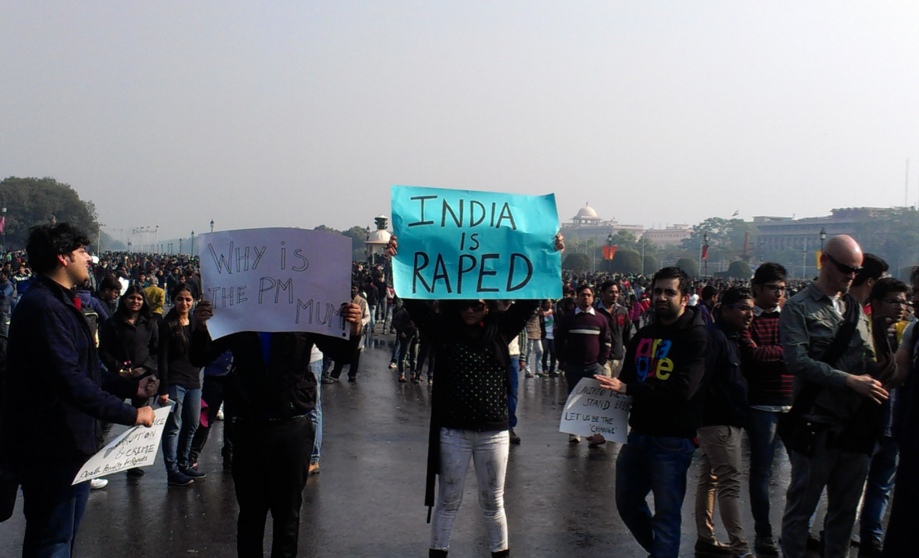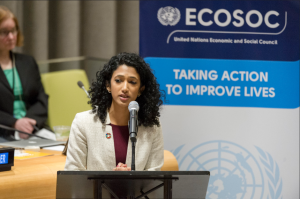
In India’s constitution, under The Criminal Law (Amendment) Act of 2013, you can find the chilling statement: “Sexual intercourse or sexual acts by a man with his own wife, the wife not being under fifteen years of age, is not rape.” India is not alone. There are 48 other nations today where a husband can legally rape his wife. In Singapore, for example, a man is not guilty of rape if the victim is his spouse and over the age of 13. Since marital rape is not a crime in India, precise numbers are hard to come by. However, a survey conducted in 2014 with over 9,000 men across seven Indian states revealed the magnitude of the problem: a staggering one in three of those men admitted to having forced a sexual act on their wives. In a country where 65% of women agree that “there are times when a woman deserves to be beaten,” the path to criminalization of marital rape is an extremely complex one.
In the week leading up to International Women’s Day, Global Citizen caught up with Trisha Shetty, one of the key players fighting to change the law in India. Shetty is a lawyer, activist, and founder of SheSays — a nonprofit seeking to end gender-based discrimination and advance women’s rights in India. The organization’s educational website receives thousands of visits a day from abused women who have nowhere else to go for support.
What’s the best way to make progress?
“Engaging in uncomfortable conversation around the issue with men. When you lay out simply the level of systematic abuse and discrimination that women experience every day, they tend to understand. Just like when I came to Global Citizen and asked the men in the room if they ever changed their clothes to protect themselves from stares, to help them feel safer wherever they were going, and they all said no. And then every single woman put her hand up in response to the same question. The most surprising thing I’ve noticed is that these young men are feeling very marginalized. They feel like they are constantly being looked at as predators. And are not part of the conversation. So it’s vital to bring them into it. And help them see they can become champions for the cause.”
And when it comes to speaking to women, what issues do you face?
“…In a country where violence within homes is such a taboo subject, how can you even address the issue when women are uncomfortable to come forward and say it’s my husband who is raping me? Women within marriages still don’t feel like they can come forward and seek help because their support networks discourage it. Parents of women are simply telling them to “Adjust. You are not special. I am being raped, your father rapes me — we just don’t call it rape.” Plus there are other factors such as women’s financial reliance on their husbands. Or even simply the issue of awareness — many women, especially the younger population do not realise that should they get married and their rapist be their own husband, he will not be punished by law. It will not even be grounds for divorce.”
Click here for the full article.
Free Yourself Global
At Transcendent Media Capital, we are a global media production company invested in effectuating social change. We partner with NGO’s, enterprises and filmmakers worldwide to create social or ecological products and campaigns that make a real and sustainable change for global issues. One of our current main projects is Free Yourself Global. This campaign, “Free Yourself Global: Healing Families; Ending Domestic Violence”, is the first interactive global domestic violence campaign incorporating social media, web and podcast series, short films, feature film, a photo book and music benefit concerts. We are also building a fully animated and interactive digital platform to assist in transforming domestic violence worldwide. This campaign explores the enculturation of violence through families across the globe, and how does one, whether the abuser or the abused, interrupt the pattern of violence? Our initiative hopes to bring together all of the voices of the participants of domestic violence, so whether you are a recovering abuser, victim/survivor and/or professional who works to aid in this cause, we want to hear your story. You can share it with us on social media using the hashtag #FreeYourselfGlobal or anonymously here, via our website.
For more info on how you can choose to tell story and how it will be used to help other people in need, or to learn how to become involved in other ways with this breakthrough campaign, email info@freeyourselfglobal.com. To simply keep up to date on our campaign and the latest news pertaining to domestic violence worldwide make sure to follow us on Facebook and Instagram.
